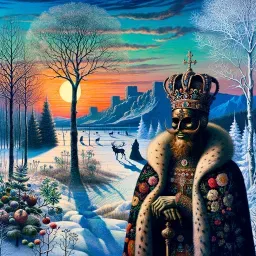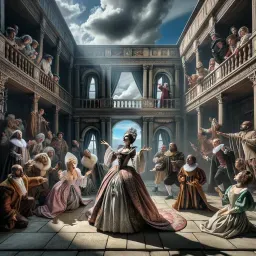Et tu, Brute?

0
0
0
0
- Meaning
- The phrase "Et tu, Brute?" translates to "And you, Brutus?" or "You too, Brutus?" in English. It conveys a deep sense of betrayal and shock. Caesar's utterance encapsulates the ultimate betrayal by a trusted friend, amplifying the tragedy of his assassination. It highlights the vulnerability and devastation humans feel when betrayed by those they hold dear.
- Allegory
- The image elements include: - **Roman Setting**: Represents the historical context of Caesar's assassination. - **Julius Caesar**: Central figure, symbolizing leadership and betrayal. - **Senators**: Encircle Caesar, embodying conspirators and symbolizing betrayal by peers. - **Brutus**: Positioned closest to Caesar with a conflicted expression, emphasizing personal betrayal. - **Columns and Statue of Rome**: Highlight the Roman setting and grandeur of the period. - **Shadows**: Extend toward Caesar, signifying betrayal closing in. - **Sunlight Stream**: Offers a visual contrast, suggesting both enlightenment and imminent disaster. These elements work in harmony to evoke the powerful themes of trust, betrayal, and the fragility of human relationships depicted by the phrase "Et tu, Brute?"
- Applicability
- This phrase can be applied to personal life or daily situations where someone experiences unexpected betrayal by a close friend, family member, or trusted companion. It serves as a poignant reminder of the potential for betrayal even in our closest relationships and encourages vigilance and awareness in interpersonal dynamics.
- Impact
- The impact of "Et tu, Brute?" on culture and society is profound. It has become synonymous with acts of ultimate betrayal and treachery. The phrase is often cited in literature, political discourse, and everyday language to denote betrayal by a trusted individual. It underscores themes of loyalty, trust, and the fragility of human relationships.
- Historical Context
- The historical context of the phrase comes from both the actual historical event in 44 B.C. when Julius Caesar was assassinated by his friend and confidante Brutus, and from the Elizabethan period when Shakespeare wrote "Julius Caesar" in 1599. The play itself mirrors concerns about political power, allegiance, and betrayal resonant in both Roman and Elizabethan times.
- Criticisms
- Criticisms and controversies around the phrase often revolve around its dramatic interpretation versus historical accuracy. Some historians argue that there is no definitive evidence Caesar actually uttered these words. This has led to debates on the authenticity versus the dramatic embellishment by Shakespeare.
- Variations
- There are no widely known variations on "Et tu, Brute?" across different cultures, but many cultures have their own expressions conveying similar sentiments of betrayal and treachery. For example, in Arabic, the phrase "ألم يكن شرف لكَ قدره؟" translates to "Did honor mean nothing to you?"
-

The golden age is before us, not behind us.
-

Now is the winter of our discontent.
-

A little more than kin, and less than kind.
-

A horse! a horse! my kingdom for a horse!
-

Good night, good night! Parting is such sweet sorrow, that I shall say good night till it be morrow.
-

This above all: to thine own self be true.
-

All that glisters is not gold.
-

The lady doth protest too much, methinks.
No Comments